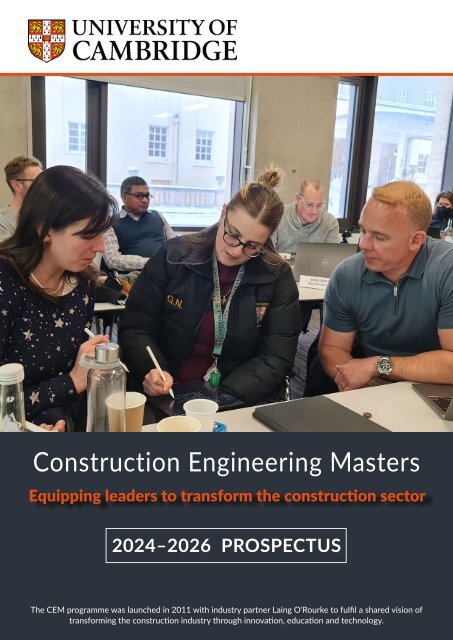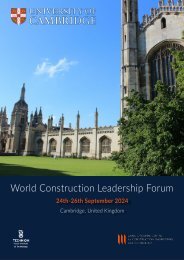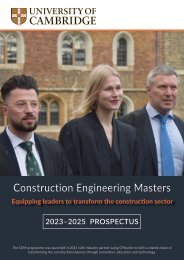CEM prospectus 2024 - 2026
The Construction Engineering Masters (CEM) is a unique leadership degree programme equipping leaders to transform the construction sector. The part-time format enables experienced industry practitioners to develop their careers and impact the sector while studying.
The Construction Engineering Masters (CEM) is a unique leadership degree programme equipping leaders to transform the construction sector. The part-time format enables experienced industry practitioners to develop their careers and impact the sector while studying.
Create successful ePaper yourself
Turn your PDF publications into a flip-book with our unique Google optimized e-Paper software.
Construction Engineering Masters<br />
Equipping leaders to transform the construction sector<br />
<strong>2024</strong>–<strong>2026</strong> PROSPECTUS<br />
The <strong>CEM</strong> programme was launched in 2011 with industry partner Laing O’Rourke to fulfil a shared vision of<br />
transforming the construction industry through innovation, education and technology.
Welcome<br />
Contents<br />
Why participate? 5<br />
About the programme 6<br />
Key learning objectives 9<br />
Academic and industry involvement 10<br />
Participants 12<br />
Dates and fees 13<br />
How to apply? 14<br />
The Construction Engineering Masters (<strong>CEM</strong>) is a<br />
part-time Master of Studies degree programme<br />
uniquely aligned to help tackle the widely recognised<br />
challenges facing the construction sector. Participants<br />
in the programme are equipped with the skills, tools,<br />
knowledge and inspiration to lead and deliver a positive<br />
transformation of the sector now and into the future.<br />
The programme explores the key challenges for the<br />
sector including productivity, creating value through<br />
innovation, particularly digital, delivering greater social<br />
value and attracting diverse talented people. The <strong>CEM</strong><br />
overlays these challenges with the urgent need to<br />
decarbonise buildings and infrastructure in the face of<br />
the climate crisis.<br />
The <strong>CEM</strong> provides a unique opportunity to galvanise the<br />
efforts of talented students, sponsoring companies and<br />
some of the brightest academics to drive meaningful<br />
change for the better in the construction sector.<br />
Dr Gavin Davies<br />
Course Director, Construction Engineering Masters<br />
•3
Why participate?<br />
The Construction Engineering Masters programme offers direct<br />
benefits to individual participants and sponsoring organisations.<br />
Benefits to students<br />
The <strong>CEM</strong> course has supported accelerated career progression for many former students. Students gain the<br />
• new skills and insights needed to tackle some of the most pressing construction challenges and are equipped to<br />
become industry leaders, making a tangible contribution to the positive transformation of the sector.<br />
The part-time format of the course permits students to continue their professional careers while<br />
• studying.<br />
<strong>CEM</strong> cohorts average 25-35 students, with each cohort forming a closely bonded group of innovative,<br />
• supportive and like-minded thinkers with significant scope for peer-to-peer learning.<br />
The course offers substantial opportunities to engage with other cohorts to further build networks,<br />
• knowledge and expertise.<br />
Students become full members of Queens’ College, where they benefit from hospitality during residential<br />
•<br />
weeks, a lifetime College membership and <strong>CEM</strong> alumni network.<br />
“<br />
This course gives me the<br />
confidence that we have access to<br />
the leading future thinking in our<br />
industry.”<br />
Mike McNicholas<br />
Atkins’ Managing Director of the Infrastructure<br />
Division for the UK and Europe<br />
Benefits to organisations<br />
For organisations that sponsor students, the programme offers two core benefits.<br />
First, sponsorship provides an opportunity to support, retain and demonstrate commitment to the<br />
• organisation’s highest flyers and to deliver future leaders.<br />
Secondly, by working with the students during and after the programme, their skills, expertise, and studies<br />
• can be focused on delivering wider benefits for the organisation. Research is usually aligned to meet the<br />
combined interests of the student and their sponsoring organisation.<br />
An increasing number of companies are adopting this programme as a key training opportunity to develop their<br />
current and future leaders.<br />
This degree is accredited by the JBM (the Institution of Civil Engineers, the Institution of Structural Engineers, the<br />
Chartered Institution of Highways and Transportation and the Institute of Highway Engineers) as meeting the<br />
requirements for Further Learning for a Chartered Engineer (CEng) for candidates who have already acquired a<br />
partial CEng accredited undergraduate first degree.<br />
•5
About the programme<br />
The <strong>CEM</strong> course is an established two-year, part-time, multidisciplinary<br />
programme that focuses on leadership, critical thinking, construction<br />
innovation and technology to address sector and societal drivers.<br />
The course is hosted by the Laing O’Rourke Centre for Construction Engineering and Technology in the<br />
Department of Engineering at the University of Cambridge in partnership with the Cambridge Judge<br />
Business School. The programme is delivered by academics from the University of Cambridge and other<br />
institutions alongside leading industry thinkers and practitioners.<br />
The <strong>CEM</strong> includes seven evenly distributed residential weeks spent in Cambridge, four in the first year and<br />
three in the second. These dedicated residential weeks are delivered on-site in Cambridge and combine<br />
teaching and learning sessions, one-to-one supervisions with academic staff and peer-to-peer learning<br />
opportunities. Please note students must attend all residential weeks in person.<br />
Each residential week is focused on a specific theme, supported by an ongoing programme of<br />
communication, leadership and research skills development:<br />
Fundamental thinking<br />
Applied skills<br />
Thought leadership<br />
and policy<br />
1 2 3 4 5 6 7<br />
The built<br />
environment<br />
Design for value<br />
Research, innovation<br />
and digital<br />
transformation<br />
Advances in<br />
construction technology<br />
and materials<br />
Advances in<br />
construction<br />
management<br />
Finance, planning and<br />
procurement<br />
The future of<br />
construction, thought<br />
leadership and policy<br />
development<br />
Explore the wider context of the<br />
built environment from both the UK<br />
and international perspectives. To<br />
include a strategic overview of the<br />
current state of the construction<br />
industry, the infrastructure in<br />
the UK and internationally, the<br />
economic and political framework<br />
within which the industry currently<br />
operates, and the management of<br />
risk and uncertainty.<br />
Build an overview of how the<br />
construction industry equips<br />
itself to achieve value and,<br />
through exploring value in<br />
different contexts, how the<br />
industry attempts to address<br />
the clients’ needs in the<br />
public and private sectors,<br />
and society at large.<br />
Acquire insights into examples<br />
of innovation emerging from<br />
current research. To include<br />
the fundamental principles of<br />
developing, implementing and<br />
managing effective innovation<br />
techniques, processes and<br />
procedures.<br />
Investigate analysis methods, modelling<br />
and the development and use of<br />
different materials. To include insight<br />
into the state-of-the-art for common<br />
materials, special novel materials,<br />
key areas of advanced construction<br />
technologies and how materials and<br />
technologies (such as robotics, artificial<br />
intelligence and the use of big data)<br />
might contribute towards advances in<br />
construction practice.<br />
Consider the concepts and<br />
methods used to manage<br />
construction projects and<br />
businesses. To include the<br />
challenges of management,<br />
the methods for planning<br />
operations and improving<br />
productivity, and key aspects of<br />
leadership.<br />
Learn about different models of<br />
financing construction projects<br />
in the UK and globally. To include<br />
elements required to support<br />
project finance and procurement<br />
such as contractual agreements,<br />
sources of capital and financial<br />
structuring, and construction<br />
law.<br />
Understand the links between<br />
construction engineering and<br />
policymaking. To include advancing<br />
students’ skills in advocacy on<br />
relevant policy issues and applying<br />
all the skills developed throughout<br />
the two-year programme.<br />
Year 1<br />
Year 2<br />
Ongoing programme to develop research and communication skills
Key learning objectives<br />
Knowledge<br />
Skills<br />
Understanding the state of the art and<br />
evaluating latest developments<br />
Enhancing leadership, communication<br />
and analytical skills<br />
“<br />
The <strong>CEM</strong> makes you<br />
look outside the<br />
boundaries of your<br />
day-to-day pressures<br />
and gives you the skills<br />
and competencies to<br />
challenge the status<br />
quo along a network of<br />
like-minded people who<br />
want to improve and<br />
make a positive impact<br />
in the Industry.<br />
Networking<br />
Engaging with policy makers, industry<br />
experts and experienced professionals<br />
Digital transformation<br />
Understanding how data and digital<br />
technologies are changing the world of<br />
construction<br />
Sustainability<br />
Designing, building and operating a<br />
net zero carbon, resource efficient and<br />
resilient future infrastructure and buildings<br />
Systems thinking<br />
Managing infrastructure as an<br />
interconnected system delivering<br />
services to society<br />
Andrew Ernest<br />
(<strong>CEM</strong> alumnus), Head of Framework<br />
Strategy at Kier Construction<br />
•9
Academic and industry<br />
involvement<br />
<strong>CEM</strong> core faculty<br />
Dr Gavin Davies<br />
Construction Engineering Masters Course Director<br />
Professor Campbell Middleton<br />
Laing O’Rourke Professor of Construction Engineering<br />
Professor Ioannis Brilakis<br />
Professor of Construction Engineering<br />
Dr Brian Sheil<br />
Associate Professor in Construction Engineering<br />
Dr Graham McShane<br />
Queens’ College - Graduate Tutor<br />
Professor Peter Guthrie<br />
<strong>CEM</strong> Fellow, University of Cambridge<br />
Dr Paul Heffernan<br />
<strong>CEM</strong> Fellow, University of Cambridge<br />
Dr Sam Stanier<br />
Associate Professor, University of Cambridge<br />
Jan Wojtecki<br />
Centre Manager<br />
Adam Cooley<br />
Construction Engineering Masters Senior Programme Coordinator<br />
Charlotte Neal<br />
Construction Engineering Masters Programme Administrator<br />
A selection of past contributors<br />
Dame Kate Barker Commissioner of the National Infrastructure Commission between 2017-2020<br />
Professor Dame Carol Black Expert Adviser on Health and Work to NHS England<br />
Dawn Bonfield Royal Society Entrepreneur in Residence, King’s College London. Director, Towards Vision.<br />
Past President of Women’s Engineering Society.<br />
Tim Chapman Former Director, Arup<br />
Dr Kayla Friedman Course Director, IDBE Master’s and Postgraduate Certificate in Sustainability Leadership<br />
for the Built Environment.<br />
Professor Keith Clarke Former CEO, Atkins<br />
Dr Sarah Fitton Director, Aurora Engagements Limited<br />
Dr Shaun Fitzgerald Director, Centre of Climate Repair, University of Cambridge<br />
Professor Alistair Gibb Professor of Construction Engineering Management Loughborough University<br />
Dr Paul Goodrum Nicholas R. Petry Professor in Construction Engineering and Management, University of<br />
Colorado Boulder<br />
Professor Peter Hansford Honorary Professor at UCL; former UK Chief Construction Adviser<br />
Dr Benn Lawson University Senior Lecturer in Operations Management. Director of the Centre for Process<br />
Excellence & Innovation (CPEI)<br />
Dr Kristen MacAskill Assistant Professor in Engineering, University of Cambridge<br />
Professor Andrew McNaughton Chairman at Network Rail (High Speed) Limited<br />
Professor Lord Robert Mair University of Cambridge<br />
Ed McCann President, Institution of Civil Engineers<br />
Dervilla Mitchell Deputy Chair of Arup Group<br />
Professor Phil Purnell Director, “Cities” Research Theme, University of Leeds<br />
Nick Raynsford Deputy Chairman of Crossrail; former Minister for Construction and Minister for Housing<br />
Dr Mark Raiss Engineering Director, Europe, Middle East & Africa, AECOM<br />
Professor Danny Ralph Judge Business School, University of Cambridge<br />
Professor Emily Shuckburgh Director of Cambridge Zero<br />
Hannah Vickers Chief of staff to CEO, MACE<br />
Paul Westbury Executive Vice President - Development & Construction, Strategy & Operations at The<br />
Madison Square Garden Company<br />
•11
Dates and fees<br />
“<br />
The networks we’ve<br />
been bringing<br />
together are very<br />
valuable, seeing<br />
what other people<br />
are doing in their<br />
companies and how<br />
we can implement<br />
that or learn from<br />
that.”<br />
Rebecca Bleeze<br />
Principal Structure Engineer at<br />
Stantec<br />
Compulsory residential weeks for <strong>2024</strong> cohort entry<br />
<strong>2024</strong><br />
15 - 20 September<br />
15 - 20 December<br />
2025<br />
30 March - 04 April<br />
06 - 11 July<br />
14 - 19 December<br />
<strong>2026</strong><br />
12 - 17 April<br />
05 - 10 July<br />
<strong>CEM</strong> students become full members of Queens’ College which provides accommodation and pastoral<br />
support for the residential weeks. This includes access to all the resources and facilities of the College:<br />
leisure facilities, library, IT. resources, dining and common rooms.<br />
Students are required to attend the residential weeks in person.<br />
Programme fees<br />
The fees for the entire two-year <strong>CEM</strong> programme include:<br />
Participants<br />
Costs<br />
Total<br />
Year one University and College fees £ 14,100<br />
Year two University and College fees £ 14,100<br />
Students are drawn from diverse international backgrounds, but they share two vital characteristics. They<br />
are all high performing professionals who have either attained a leadership role or been identified as<br />
future leaders in their organisations. Additionally, <strong>CEM</strong> students share an ambition and determination to<br />
build a better construction industry now and for the future that delivers against global societal needs and<br />
challenges.<br />
The <strong>CEM</strong> welcomes applications from professionals from all organisations across the construction sector,<br />
including building and infrastructure clients, national and local government, consultants, contractors,<br />
specialist providers, legal and management firms, equipment manufacturers and suppliers to the industry.<br />
We particularly welcome applications from individuals from under-represented groups.<br />
Previous participants have included CEOs, engineers, architects, lawyers, asset and commercial managers,<br />
technology providers and manufacturers.<br />
Accommodation* and meals<br />
(based on an average of £250 per residential week)<br />
£1,750<br />
Application processing fee £50<br />
* Please note accommodation rates are set independently by Queens’ College.<br />
Most of our students obtain full or partial funding from their employer. Where this is not possible, bursaries<br />
may be available for a proportion of the combined University and College fee. Please contact the Centre<br />
Manager for more information.<br />
•13
How to apply?<br />
Are you an experienced professional with the<br />
ambition to drive sustainable and meaningful<br />
transformation of the construction industry? Then<br />
the <strong>CEM</strong> degree programme could be ideal for you.<br />
To apply, you will need to have a first or upper second class UK honours<br />
degree or overseas equivalent in a relevant or related discipline. Applicants<br />
must also demonstrate significant industry experience and a high standard of<br />
academic writing.<br />
If you have alternative qualifications and experience please contact the <strong>CEM</strong><br />
Senior Programme Coordinator for advice. For more information about the<br />
course and details of how to apply please visit our website:<br />
www.construction.cam.ac.uk/education/cem<br />
Applications are considered in two gathered fields;<br />
firstly after the 31st December and then after the<br />
application deadline of 1st May <strong>2024</strong>.<br />
Apply now<br />
“<br />
The breadth of the course allowed me to explore<br />
and investigate unfamiliar topics in detail and<br />
develop expertise beyond my field whilst giving<br />
me the confidence to apply it in practice. The<br />
quality, intensity and focus of the course are<br />
inspirational!”<br />
Rebecca Bleeze<br />
(current <strong>CEM</strong> student), Associate at Stantec<br />
•15
Photo: The Civil Engineering building by Max Fordham LLP<br />
Find out more<br />
For further information about the programme please contact:<br />
Adam Cooley<br />
Construction Engineering Masters Senior Programme Coordinator<br />
cem.admin@construction.cam.ac.uk<br />
Laing O’Rourke Centre for Construction Engineering and Technology<br />
Civil Engineering Building<br />
University of Cambridge<br />
7a JJ Thomson Avenue<br />
Cambridge, CB3 0FA<br />
United Kingdom<br />
www.construction.cam.ac.uk/cem-programme<br />
@<strong>CEM</strong>Cambridge<br />
https://www.linkedin.com/company/construction-engineering-masters/<br />
The <strong>CEM</strong> programme was launched in 2011 with industry partner Laing O’Rourke to fulfil a shared<br />
vision of transforming the construction industry through innovation, education and technology.







